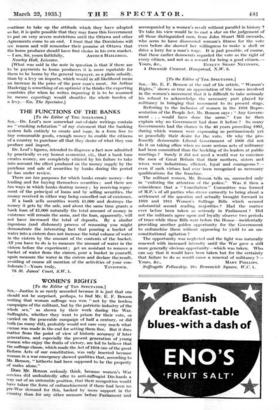WOMEN'S RIGHTS [To the Editor of THE SPECTATOR.]
SIR,—Justice is so rarely accorded because it is just that one should not be surprised, perhaps, to find Mr. E. F. Benson writing that woman suffrage was won " not by the lawless campaigns of the militant, but by the patriotic industry of the whole sex," as shown by their work during the War. Suffragists, whether they went to prison for their vote, or carried on the peaceable campaign of half a century, or did both (as many did), probably would not care very much what excuse was made in the end for setting them free. But it does matter from the point of view of historic accuracy if later generations, and especially the present generation of young women who enjoy the fruits of victory, are led to believe that the suffrage clause, which made the Act of 1918 one of the great Reform Acts of our constitution, was only inserted because woman in a war emergency showed qualities that, according to Mr. Benson, " hitherto had been supposed to be the property of males alone."
Does Mr. Benson seriously think, because women's War services did undoubtedly offer to anti-suffragist Die-hards a way out of an untenable position, that their recognition would have taken the form- of enfranchisement if there had been no pre-War demand for this, backed by more support in the country than for any other measure before. Parliament and accompanied by a women's revolt without parallel in history ? To take. his view would be to cast a slur on the judgement of all those distinguished men, from John Stuart Mill onwards, who seem to have discovered woman's fitness for the vote even before she showed her willingness to make a shell or drive a lorry for a man's wage. It is just possible, of course, that these earlier democrats regarded the vote as the right of every citizen, and not as a reward for being a good citizen.—




























































 Previous page
Previous page